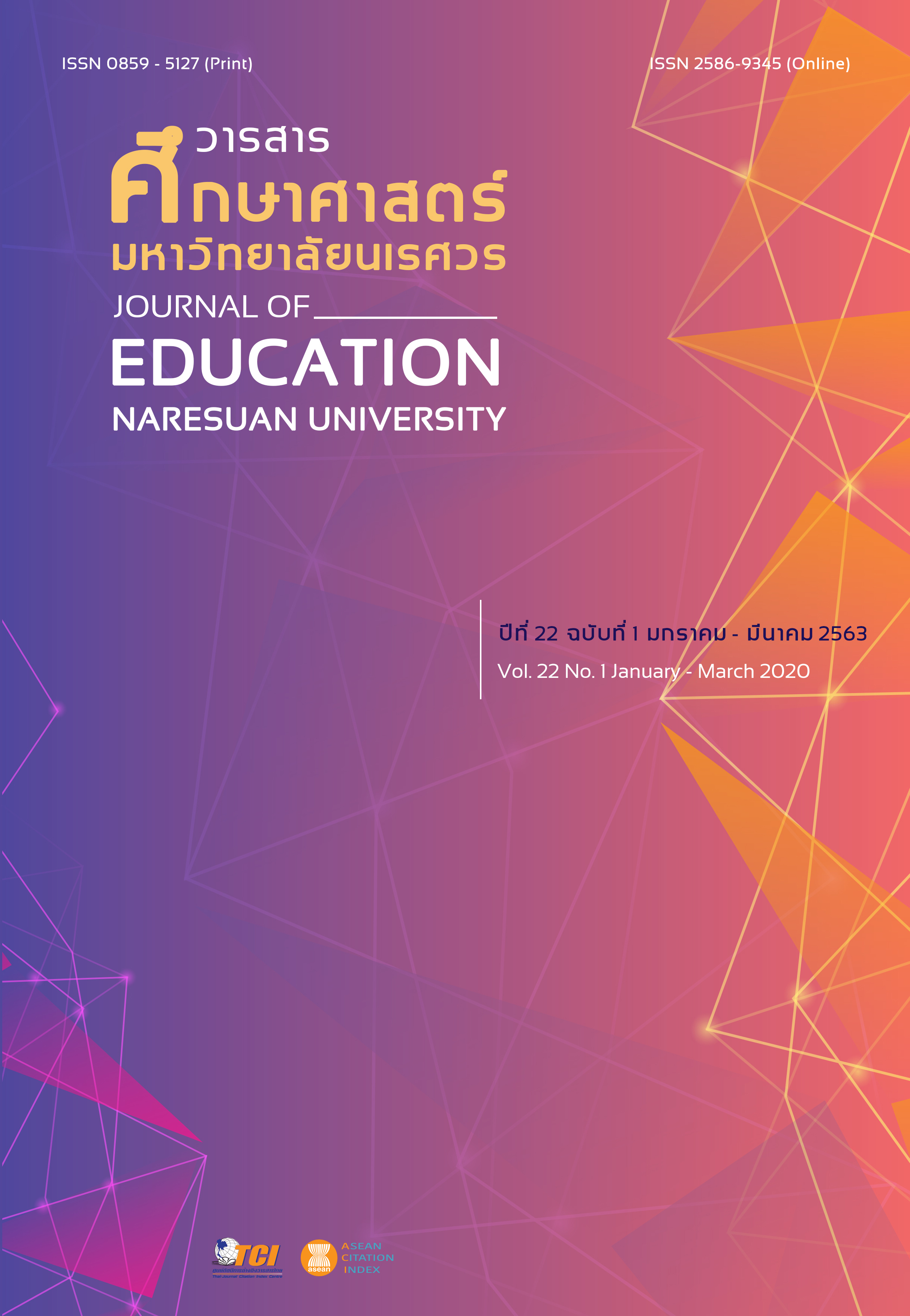THE STUDY OF PHYSICS PROBLEM SOLVING ABILITY AND PHYSICS ACHIEVEMENT ON MOMENTUM AND COLLISIONS OF TENTH GRADE STUDENTS BY USING THE INQUIRY METHOD INCORPORATED WITH POLYA’S PROBLEM SOLVING TECHNIQUE
Main Article Content
Abstract
The purposes of this research were to compare physics problem solving ability and physics achievement of tenth grade students after using the inquiry method incorporated with Polya’s problem solving technique with 70 percent criteria and to compare physics achievement of tenth grade students after using the inquiry method incorporated with Polya’s problem solving technique with before using that. The participants of this research consisted of 41 tenth grade students in the second semester of academic year 2016 at Saensuk School, Chonburi Province. They were selected through the cluster random sampling. The research instruments were lesson plans using the inquiry method incorporated with Polya’s problem solving technique, physics problem solving ability test, and physics achievement test. The data were analyzed by using mean, standard deviation, one sample t-test, and dependent sample t-test. The results of this research showed that physics problem solving ability and physics achievement of tenth grade students after using the inquiry method incorporated with Polya’s problem solving technique were statistically significant higher than the 70 percent criterion at the .05 and the posttest scores of physics achievement were statistically significant higher than the pretest scores of that at the .05.
Article Details
The owner of the article does not copy or violate any of its copyright. If any copyright infringement occurs or prosecution, in any case, the Editorial Board is not involved in all the rights to the owner of the article to be performed.
References
Chuenchob, O. (2006). Development of physics achievement and physics problem solving skill of Matthayomsuksa IV students using inquiry method of teaching enhanced by polya’s problem solving technique (Master thesis). Chonburi: Burapha University. [in Thai]
Dechakhup, P. (2002). Science teaching behavior. Bangkok: Institute of Academic Development. [in Thai]
Dramae, A. (2015). Effects of inquiry-based approach and polya’s problem solving on physics achievement and problem solving ability of grade 12 students (Master thesis). Songkla: Prince of Songkla University. [in Thai]
Khochongdi, P. Teacher at Saensuk School. (2016, February 15). Interview. [in Thai]
Limtasiri, O. (2013). Curriculum and instruction in elementary school (6th ed.). Bangkok: Ramkhamhaeng University Press. [in Thai]
Maensanguan, S. (2013). Mathematics teaching behavior 2 (2nd ed.). Bangkok: Ramkhamhaeng University Press. [in Thai]
Makhanong, A. (2010). Skills and mathematical processes. Bangkok: Chulalongkorn Printing. [in Thai]
Ministry of Education. (2008). The Basic Education Core Curriculum (A.D.2008). Bangkok: The Agricultural
Co-operative Federation of Thailand Printing. [in Thai]
Moonkham, S., & Moonkham, O. (2003). 21 Learning management for development thinking process
(4th ed.). Bangkok: Parbpim Printing. [in Thai]
Naoyenphon, P. (1995). Mathematical problem solving: the development of computation skill of elementary school students. Bangkok: Chulalongkorn Printing. [in Thai]
National Institute of Educational Testing Service (Public Organization). (2016). The Result of the Ordinary National Educational Testing (O-NET) of academic year 2016. Retrieved May 14, 2016, from https://www.niets.or.th/ [in Thai]
Polya, G. (1957). How to solve it (2nd ed.). New York: Doubleday & Company.
Ruangsomsamai, S. (2013). The effect implementing learning management by inquiry cycle (5E’s) on
the science problem solving ability and science learning achievement of Matthayomsuksa I students Wat Songtham School Samutprakarn Province (Master thesis). Bangkok: Dhonburi Rajabhat University. [in Thai]
Seenama, P. (2014). the development of learning activity package by using polya solving problem process on linear programming for Mathayomsuksa VI students (Master thesis). PhitsanuloK: Naresuan University. [in Thai]
Sintunawa, P., Nualpang, K., & Angganapattarakajorn, V. (2016). The effects of student team achievement divisions learning activity and polya problem solving process on mathematics problems solving ability of Pratomsuksa 5 students. Journal of Education Naresuan University, 18(4), 238-250. [in Thai]
The Institute for the Promotion of Teaching Science and Technology. (2008). The mathematical skills. Bangkok: Charoen Printing. [in Thai]
The Institute for the Promotion of Teaching Science and Technology. (2010). Teacher’s manual. Bangkok: Kurusapa Printing Ladphrao. [in Thai]
Thipkhong, S. (2001). Problem solving. Bangkok: Kurusapa Printing Ladphrao. [in Thai]
Worakham, P. (2016). Educational research (8th ed.). Maha Sarakham: Takkasila Printing. [in Thai]


